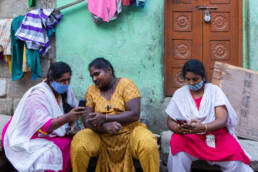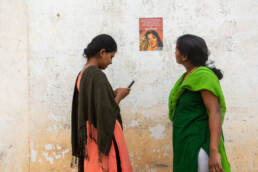Meeting critical health needs of women and girls during Covid-19 in India.
At The Case for Her, we take pride in our ability to move quickly. This need for fast action was never more urgent than when it became clear the Covid-19 pandemic was causing disruptions in health services and supply chains that affected the sexual and reproductive health of women and girls around the world.
We previously outlined our actions in response to Covid-19, including providing Covid-19 relief funding to sources like the Acumen Emergency Facility (AEF). The AEF was set up in response to the pandemic to provide support and relief to social enterprises adversely affected or forced to modify in response to Covid-19. One recipient of the AEF funding is Sukhibhava, a nonprofit organization based in Bangalore, India, striving to destigmatize menstruation and increase access to menstrual health information and products.

Co-Founder Dilip Kumar Pattubala first learned about the lack of menstrual health options for women when he began working for a social enterprise in Bangalore. Surprised by this information, and concerned about the far-reaching implications it has on women’s equality, Dilip began to research the problem. When he discovered that many women in India did not even know what a menstrual pad was, Dilip decided to dedicate his life to menstrual health.
Sukhibhava launched in 2014 under the idea that increasing product availability would resolve women’s menstrual health needs. Sales reps entered into communities with baskets of affordable menstrual pads, but even though they were successful in selling their products, Dilip and his team quickly realized that this was not a long-term solution to the problems they observed. The women that were not using menstrual pads before, were still not using them now.
“Selling products is just a bandaid, if we really want to heal the injury we have to enable change.” – Dilip Kumar Pattubala, Co-founder of Sukhibhava
As Dilip and his team considered the problems in their business model, Dilip accepted an opportunity that would change his life: he became an Acumen fellow. According to Dilip:
“Going through the program helped me understand why I do what I do. Before then I simply saw a gap in the supply chain, but the fellowship program made me understand my passion for stigmatized issues.”
Through learnings gained in the Acumen fellowship and on-the-ground experience with his sales team, Dilip began to fully understand the lived experience of his menstruating customer. In 2016, Sukhibhava found its stride and has since been providing 4-week training programs in menstrual health for small community groups. Independent facilitators from within the communities served are trained to become resource persons at the front-lines, providing a safe space to take their groups through the program, which includes:
- Week 1: Getting comfortable with your body
- Week 2: Product use and disposal, PMS, and menopause
- Week 3: Encourage critical thinking about stigmas and why we do what we do
- Week 4: Learn how to have conversations about menstruation with family, doctors, and friends
With these workshops, Sukhibhava has been able to reach over 162,000 women across seven states in India. The onset of Covid-19 and the social restrictions imposed to contain its spread threatened to upend this progress: Sukhibhava was no longer able to execute on-the-ground programs. Once again, Dilip needed to lead his team in a responsive turn-around to understand and meet the critical problems women and girls were facing in this new context, frontline workers were turned into helpline workers, and ‘Hello Saheli’ was born.
With a grant from the Acumen Emergency Facility, the Sukhibhava team was able to seamlessly focus on building Hello Saheli without worry about shutdowns or lay-offs due to a lack of funds. The new service was up and running within days, and had served 350 women within its first 10 days of operation.

‘Hello Saheli’ is a phone service available free of charge to anyone in India speaking Hindi or Kannada. A call to Hello Saheli gives a caller two options: to receive a call back with pre-recorded educational information, or a live call from a trained helpline worker. Pre-recorded information about menstrual health includes how to manage with materials you have at home, how to seek help from family, and when you should go to a doctor. If the caller requests access to the helpline, trained workers will answer questions or set up a consultation call with a gynecologist. Prescriptions for minor issues can be given over the phone with a follow-up call in seven days, while more serious issues are referred to medical doctors.
Dilip considers Hello Saheli an intervention born out of short-term need, but one that has long term value in the Sukhibhava product and services line. For now, Sukhibhava will continue to offer free telehealth consultations for as long as necessary.
—
Sukhibhava is currently searching for community-based organizations in Hinda or Kannada speaking regions to expand the reach of Hello Saheli. If you are interested in partnering with Sukhibhava in other ways, please reach out to Dilip Kumar Pattubala.
- Wendy Andersonhttps://thecaseforher.com/blog/author/wendy/
- Wendy Andersonhttps://thecaseforher.com/blog/author/wendy/
- Wendy Andersonhttps://thecaseforher.com/blog/author/wendy/
- Wendy Andersonhttps://thecaseforher.com/blog/author/wendy/


